













Hoots in the Night
The Ar t of Obser ving O wls

















Nestled near New Hampshire’s White Mount ains, The Rocks is a year-round destination for visitors with a new visitor center and family-friendly activities across 1 , 4 0 0 acres.
Walking trails • Wildlife watching
Self- guided histor y tour • Gif t shop
Interpre tive exhibits • N H Maple Museum
Wildflower Walks • Maple Tours
Christmas tree farm • Educational programs Vacation rent als • Wedding packages
Forest So cie ty Nor th at The Ro cks builds on a tradition of conser vation, education and innovation.

Thanks to more than 5 0 0 donors, we are 8 5% to our goal – help us comple te this $8 . 5 million campaign by making a gif t today!
Dona te a t forestso cie t y.or g/fsn
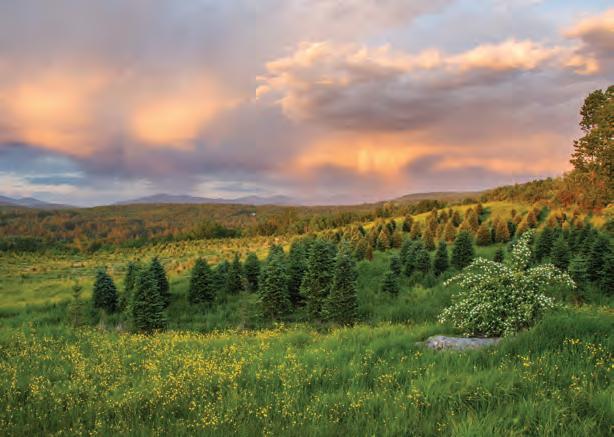

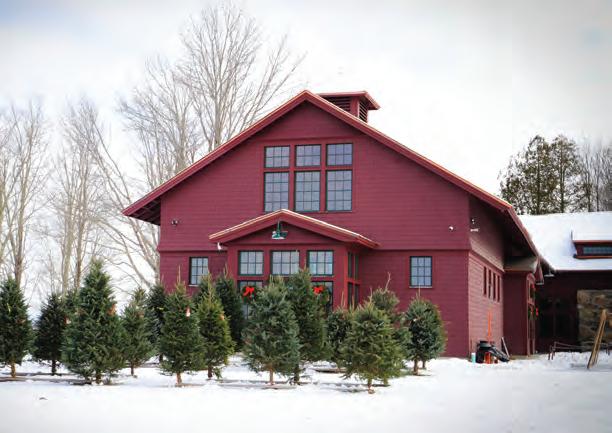
1
Be thlehem, N H 0 3 5 74
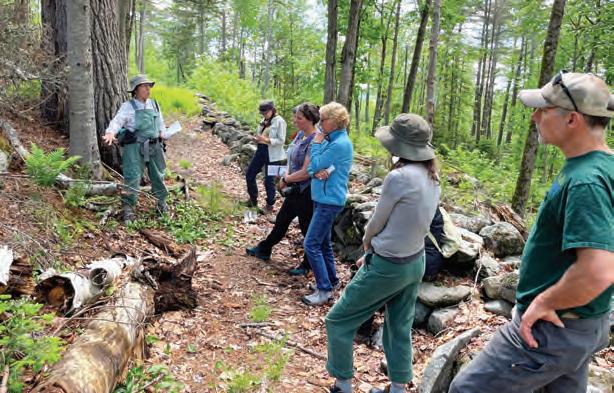

8 Deepwood Forest
A new conser vation easement in Canterbur y and Nor thfield protects nearly 400 acres home to beaver ponds, vernal pools, forests, and ledge outcrops
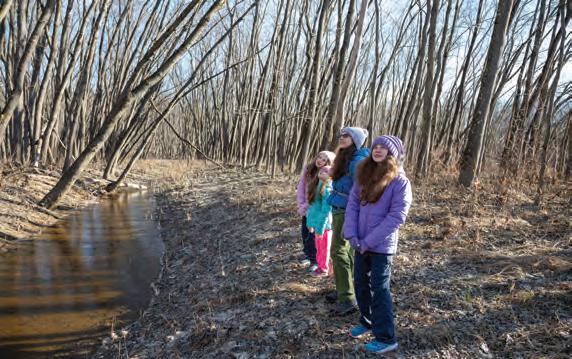
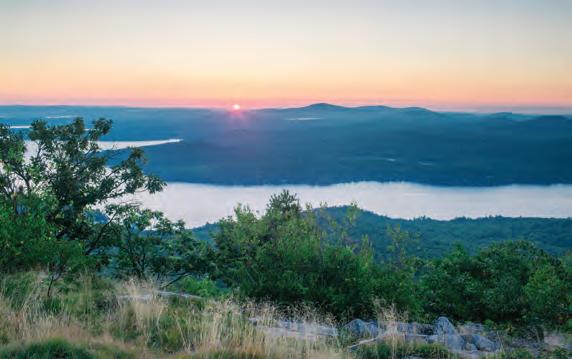
14
Late winter is an ideal time to listen to and see these hidden wonders of the woods
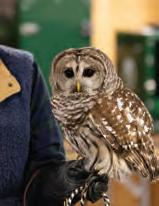
CHAIR
Drew Kellner, Brookline
VICE CHAIR
Peter Fauver, North Conway
SECRETARY
Allyson Hicks, Concord
TREASURER
Jason Hicks, Meredith
PRESIDE NT
Jack Savage, Middleton
Susan Arnold, Strafford
Philip Bryce, Deering
Deb Buxton, Greenfield
George Epstein, Silver Lake
Don Floyd, Concord
Jameson French, Portsmouth
Patricia Losik, Rye
Nancy Martland, Sugar Hill
Michael Morison, Peterborough
Elizabeth Salas, Weare
Bill “ Tuck” Tucker, Goffstown
Tom Wagner, Campton
Janet Zeller, Concord
STAFF
Ben Aldrich, Field Forester
Frank Allen, Building and Grounds Assistant
Sarah AlSamaraee, Stewardship & Forestry Administrative Coordinator
Dave Anderson, Senior Director of Education
Brie Belisle, Regional Stewardship Manager
Anna Berry, Director of Communications and Digital Outreach
Nik Berube, Maintenance Assistant
Naomi Brattlof, Director of Easement Stewardship
Rita Carroll, Tree Farm Administrator
Tony Cheek, Vice President for Finance
Connie Colton, Land Protection and Stewardship Coordinator
Linda Dammann, Development Assistant
Carrie Deegan, Reservation Stewardship and Engagement Director
Leah Hart, Land Conservation Project Manager
Stacie Hernandez, Land Conservation Project Manager
Brian Hotz, Vice President for Land Conservation
Steve Junkin, Field Forester
Sarah Kern, Creek Farm Education Program Coordinator
Susanne Kibler-Hacker, Senior Philanthropy Advisor
Allan Krygeris, Senior Technolog y Specialist
Matt Leahy, Public Policy Director
Cameron Larnerd, Christmas Tree Farm Manager, The Rocks
Margaret Liszka, Membership Director
Nigel Manley, Senior Outreach Manager, The Rocks
Ann McCoy, Development Manager
Stephanie Milender, Human Resource Director
Jack Minich, Regional Stewardship Manager
Scarlett Moberly, Program Director, The Rocks
Michelle Morse, Finance Specialist
Carl Murphy, Facilities Manager
Sophie Oehler, Communications Coordinator
Cara Pearson, Membership Specialist
John Plummer, Regional Stewardship Manager
Meredith Reed O’ Donnell, Foundation Relations Manager
Tina Ripley, Administrative Coordinator
Jack Savage, President
Matt Scaccia, Recreation and Community Relations Manager
Ryan Smith, Communications Manager
Ron Snow, Manager of Individual Giving
Maria Stewart, Senior Executive Assistant
Dylan Summers, Stewardship Projects Manager
Laurel Swope-Brush, Land Steward & Volunteer Programs Coordinator
Anne Truslow, Vice President for Development
Wendy Weisiger, Managing Forester
Harriette Yazzie-Whitcomb, Administrative Assistant
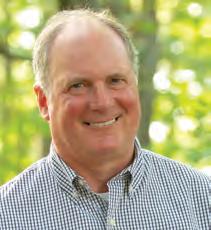
The changing climate is impacting forests in New Hampshire. Our foresters are seeing it on the ground More frequent extreme storm events are washing out culverts, bridges, roads, and trails Expanding ranges of pests threaten the resiliency of our tree species, forests, and wildlife On average, our winters are different.
And, thanks to climate change, it seems like ever yone now has a strong opinion about how forests should be managed. As Matt Leahy, our director of policy, writes in this issue of Forest Notes, the emergence of carbon markets is bringing this discussion out in the open It’s a complicated subject that challenges us on how we choose to define sustainability
I hear frustration and exasperation in the voices of foresters, loggers, mill owne r s , h o m
lands, and lovers of diverse wildlife habitats as they engage a vocal minority who argue that forests should be left universally untouched, with the hope and uncertain promise that this will maximize net carbon uptake and storage.
For many, it can be hard to accept that short-term disturbance from a harvest can yield long-term benefits Sometimes overlooked in the discussion is the most existential threat to forests over our lifetimes, hard conversion New Hampshire loses an average of 5,000 acres of forest annually When a forest is turned into a paved parking lot or other impervious development it’s unlikely to return to forest.
S u s
Change (IPCC) Special Report on Climate Change, “Sustainable forest management can prevent deforestation, maintain and enhance carbon sinks, and can contribute towards GHG emissions-reduction goals. Sustainable forest management generates s o c i
a n d p r o v i d e s fiber, timber, and biomass to meet society’s growing needs ”
We concur with the climate scientists Sustainable forest management can help all landowners, both public and private, reach the long-term outcomes the IPCC describes (including carbon uptake and forest conser vation) as well as fostering resilience, diversifying wildlife habitats, and enhancing outdoor recreation.
T h e F o r e s t S o c i e t y h a s a l w a y s c a r e d deeply about how forests are managed. At times, such topics meant for a relatively lonely dialogue We should welcome a moment in time in which forest management is publicly discussed We should also always be open to study and learning, prepared to adjust our thinking and our practices And, most of all, strive to keep forests as forests.

Jack Savage is the president of the Society for the Protection of New Hampshire Forests. H e c a n b e re a c h e d b y e m a i l a t j s a v a g e @forestsociety.org.
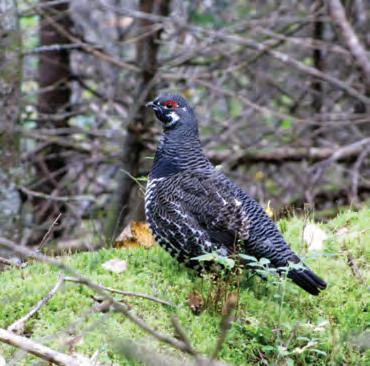
The Audacious Gallinaceous Finding a fir needle forager forestsociety.org/sprucegrouse
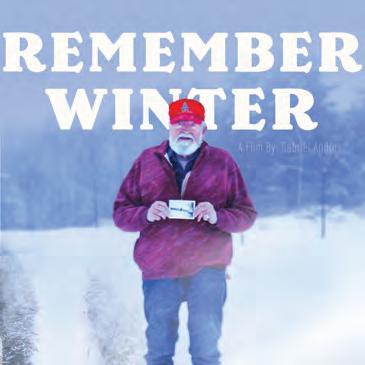
Remember Winter
Filming what might be forgotten forestsociety.org/remember winter
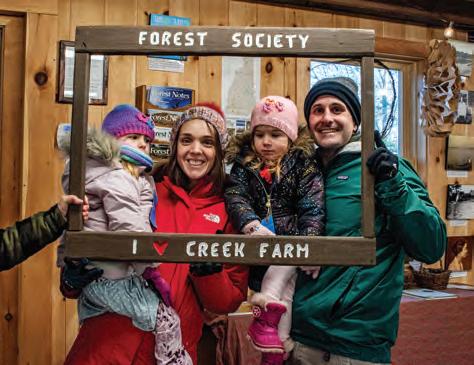
“A big thank you goes out to everyone who joined us on New Year’s Day for NH First Day Hikes 2024, and for sending us your photos, too! Lots of smiling faces here!” @nhstateparks
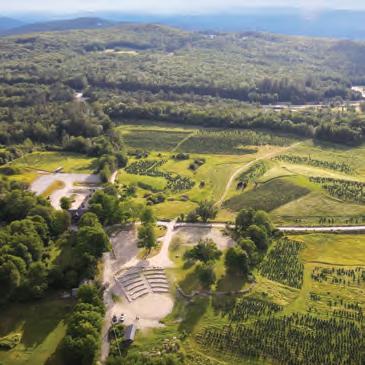
A Video with a Vision
Building the future at The Rocks forestsociety.org/buildingthefuture
facebook.com/ForestSociety
@ForestSociety
@Forest Society
Society for the Protection of New Hampshire Forests
A nonprofit membership organization founded in 1901 to protect the state’s most important landscapes and promote wise use of its renewable natural resources
Basic annual membership fee is $45 and includes a subscription to Forest Notes
Editor: Ryan Smith
Design & Production: The Secret Agency
Printing: R.C. Brayshaw & Company, Inc.
Forest Notes is printed on elemental chlorine-free Sappi Flo paper with 10 percent post-consumer recycled content. Sappi Flo is made from pulp purchased from suppliers who document sound environmental practices and sustainable forest management.
Permission is required for reproduction of any part of this magazine.
Copyright 2024 SPNHF. US ISSN: 0015 7457
54 Portsmouth Street, Concord, N.H. 03301 | Phone: 603-224-9945 | Fax: 603-228-0423 info@forestsociety.org | forestsociety.org
The Forest Society proudly supports the following organizations:



Cosponsor Member Under writer

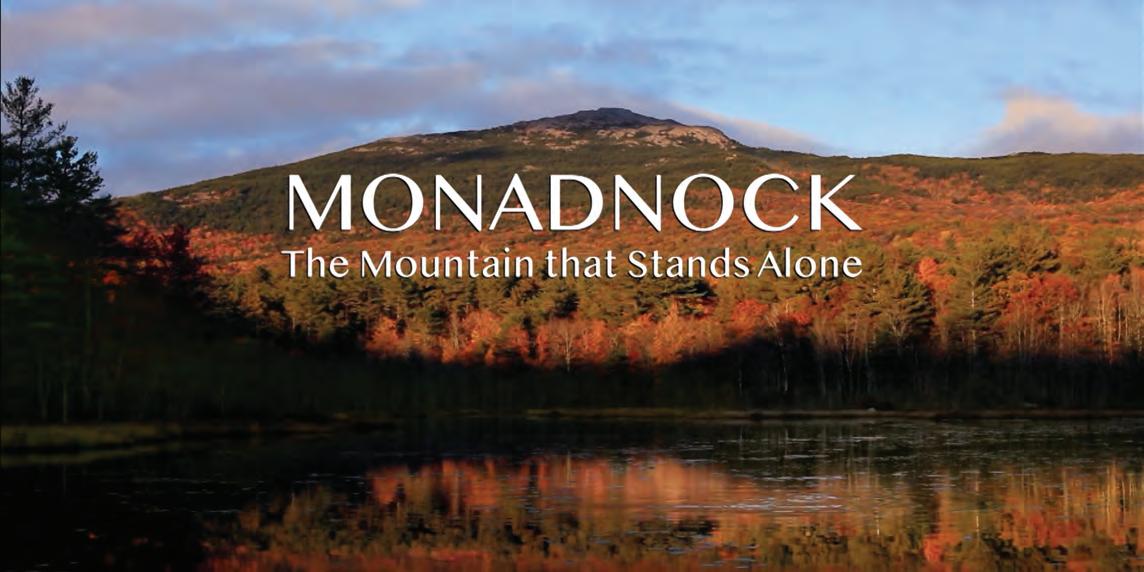
The new documentary film Monadnock: T h e M o u n t a i n t h a t S t a n d s A l o n e , w h i c h w a s r e l e a s e d i n N o v e m b e r 2 0 2 3 , i s t h e c u l m i n a t i o n o f m o r e t h a n 1 3 y e a r s o f d e d i c a t e d w o r k b y fi l m m a k e r D a n i e l J White of Rabbit Ear Films and writer Craig Brandon. Both longtime residents of the Monadnock region, White and Brandon h a v e p r o d u c e d a v i s u a l l y s t u n n i n g c h r o n i c l e o f t h e m o u n t a i n ’s p a s t a n d e n d u r i n g r o l e i n t h e p u b l i c c o n s c i e n c e T h e h o u r - l o n g d o c u m e n t a r y t e l l s t h e s t o r y o f h o w t h e m o u n t a i n g a i n e d a dedicated and passionate following that n o t o n l y c o n t r i b u t e d t o i t s p o p u l a r i t y b u t a l s o i t s d e g r a d a t i o n T h e p h r a s e “ t h e m o u n t a i n t h a t s t a n d s a l o n e ” m a y be somewhat of a misnomer, depending o n y o u r p e r s p e c t i v e . W h i l e M o n a d n o c k indeed rises prominently above its lowerl y i n g s u r r o u n d i n g s , i t h a s , t h r o u g h o u t i t s h i s t o r y, s e e n c o u n t l e s s p e o p l e h i k e i t s t r a i l s , fi n d i n s p i r a t i o n i n i t s s c e n i c beauty, and protect its natural resources.
T h e f i l m s e a m l e s s l y i n t e g r a t e s t h e cultural and natural histories of the mountain while incorporating a multitude of perspectives that illustrate deeply personal connections Inter views with naturalists, a r t i s t s , I n d i g e n o u s p e o p l e s , h i s t o r i a n s , hikers, and others provide contemporary i n s i g h t s w h i l e e a r l y l i t e r a r y v o i c e s a r e brought to life with poignant quotations that reveal how the mountain has been viewed over time. A splendid variety of videography, artwork, and archival footage and photos capture the essence of M o n a d n o c k a c r o s s t i m e a n d s e a s o n s , while a lively original score performed by the Apple Hill String Quartet sets the tone. Wi t h s u c h a w i d e r a n g e o f v i e w p o i n t s covered, it is easy to find ways to reflect on h o w y o u m a y p e r s o n a l l y r e l a t e t o t h e story of the mountain
A prominent theme of the film explores the value of conser vation and stewardship of Monadnock’s landscape and how t h o s e r e s p o n s i b i l i t i e s m a t t e r t h r o u g h
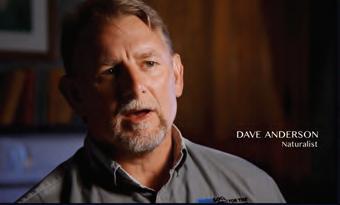
time. “Today, we enjoy the benefits of the work that was done by our predecessors,” says Senior Director of Education Dave Anderson, who is featured in the film “That spectacular natural heritage is a gift to us from the hard work of countless individuals and organizations over a century and a half. I would ask people when they climb the mountain to think about what our generation’s time means. What is our responsibility to the mountain? There’s a power there ” The Forest Society currently owns 4,519 acres on Monadnock and Jaffrey in Dublin Much of this is leased to the State of New Hampshire and operated as Monadnock State Park.
N o d o u b t t h i s f i n e
c r a f t e d f i l m will endure as an important resource for a u
well into the future
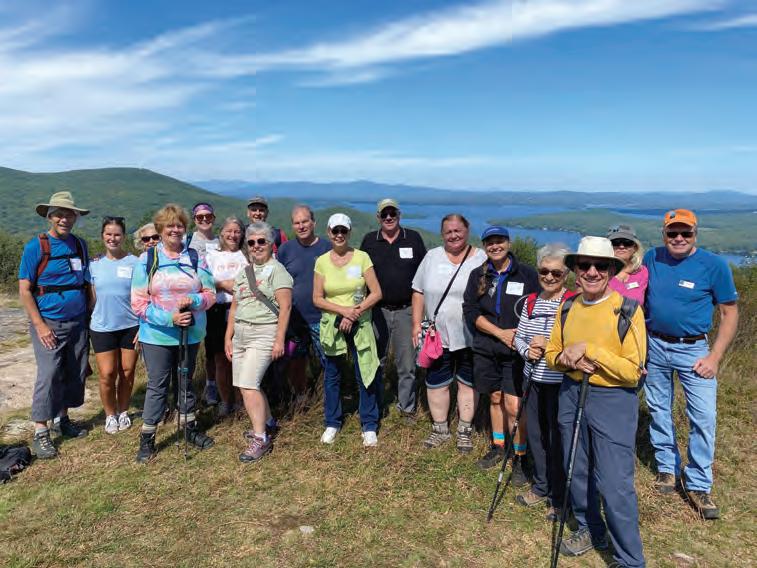
The Forest Society’s 5 Hikes Challenge continues to receive accolades as a motivator for young and old to get outside to improve their mental and physical health and to discover more about the natural world To learn about the 2024 5 Hikes Challenge coming this autumn, sign up for the monthly e-newsletter Tree Mail or watch for announcements in upcoming issues of Forest Notes magazine this summer In the meantime, check out what some participants had to say about the 2023 Challenge here:
Welcome to our column!
Our team ensures the perpetual stewardship of over 130,000 protected acres across the state.
Meet our stewardship managers and look for us in upcoming editions to learn more!
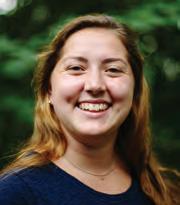

Gorge, but the other trails were new to us We have recommended these trails to others, and we will return to them all, especially the Gold Mine at David Dana Forest ”
– Carol and David Wagner, and Sadie
“ I w a s r e a d i n g T h e B
a
f o
t h
N H Humanities Big Read So I ended the 5 Hikes Challenge with Mount Monadnock once I finished the book. My friend and I tried making some pine needle tea when we got home like the girl in the book drinks, so that was fun. Also, it was fun and exciting to kick off the challenge with the group hike!”
– Tressa CliftonChallenge and look for ward to it ever y fall. Next year we have already picked the locations we want to adventure to.”
– Sue Tremblay“I had such a great time participating in the 5 Hikes Challenge This was actually the first time in years that I had any free time as my youngest star ted pre-kindergar ten this fall, and I could not wait to have some time to enjoy the beauty and solitude of the woods by myself I didn’t get to complete the Challenge due to lack of ability to travel far for different hikes, but I did Pine Mountain in Alton a half dozen times and Cooper Cedar Woods in New Durham a few times as well as taking the family to Creek Farm, which was amazing ”
– Corey Therrien
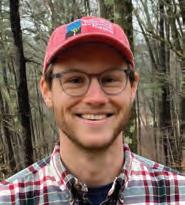
forestsociety.org/steward-contact

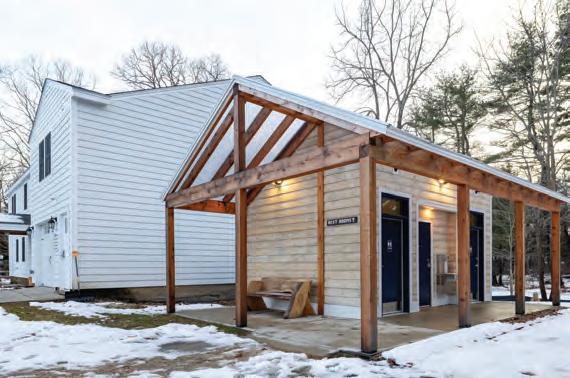
Creek Farm’s new restroom facility includes two family-style restrooms, a water bottle fill station, and a covered waiting area
T h e F o r e s t S o c i e t y i s e x c i t e d t o announce the opening of public restrooms at Creek Farm in Portsmouth. The new r e s t r o o m s h a v e t w o f a m i l y - s t y l e s t a l l s , a water bottle fill station, and a covered waiting area. They are available for public use from dawn to dusk and during evening programs. The education center at Creek Farm opened in 2021 and provides four-season program space for the Forest Society and partner organizations, including the Gundalow Company
“ T h i s i s a m u c h - n e e d e d i m p r o v ement that will enhance Creek Farm as a great local destination for visitors,” Forest Society President Jack Savage says. “Whether you’re here for a walk on the Little Harbor Loop Trail, to paddleboard in Sagamore Creek, to attend a program in our Creek Farm Education Center or attend a kids camp during the summer, the new four-season restrooms will help ensure that this conservation area is welcoming and accessible to the community ” Two walls of the new structure feature pine siding sourced from trees that were felled on Little Harbor Road and milled onsite by AJ Dupre of the Urban Forestry Center, part of the NH Division of Forests and Land A new bench, built by volunteers, is constructed of the same wood, also milled onsite.

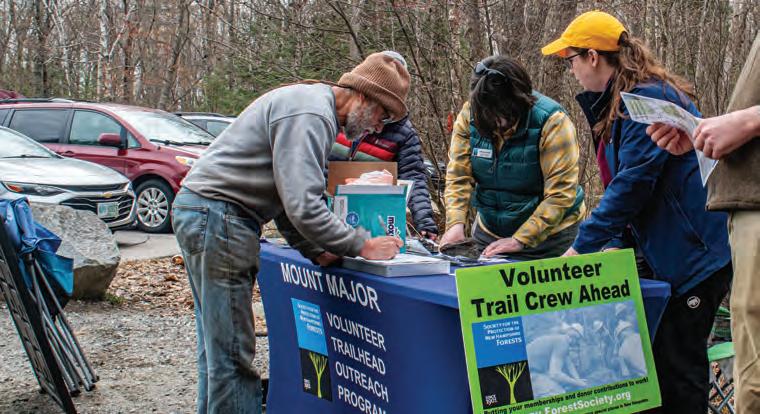


The facility was designed by Placework a n d b u i l t b y C h i n b
B u i l d e r s . T h i s
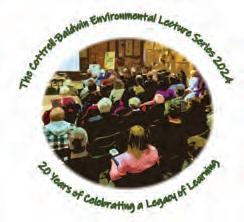
The event series is free, but registration is appreciated to speed up sign-in on the day of. To register or for more information, call 603-224-9945 ex t. 313 or visit forestsociety.org/events.
Th i s y e a r ’s 2 0 t h a n n u a l C o t t r e l lB a l d w i n E n v i r o n m e n t a l L e c t u r e s e r i e s , p r e s e n t e d b y t h e F o r e s t Society and the N H Division of Forests and Lands, features presentations about forests young and old, fading winters, forest carbon, and local wood products. The series takes place at the Fox Forest Henry I B a l d w i n E n v i r o n m e n t a l C e n t e r i n Hillsborough. Whether you join for one or all of the presentations, we hope you’ll leave inspired by what our speakers have to say
The Forgotten Forest Primeval Screening and Discussion
T h e r e i s r e n e w e d i n t e r e s t i n N e w England’s remaining old growth forests, including one that former Forest Society President/Forester Philip Ayers discovered i n t h e e a r l y 1 9 0 0 s o n M o u n t S u n a p e e in Newbur y This discover y sparked the c a m p a i g n t o p u rc h a s e a n d p r o t e c t t h e mountain in 1912. One hundred years later, ecologist Chris Kane rediscovered the forest on his quest to find other old growth forests in the state Following the screening of The Forgotten Forest Primeval, New Hampshire Natural Heritage Bureau e c o l o g i s t J e s s i c a B o u c h a r d w i l l a n s w e r questions on old forests and discuss the h i s t o r y o f N a t u r a l H e r i t a g e o l d f o r e s t inventories at Mount Sunapee
MA R C H 26 | 7–8:30 P M
Remember Winter Screening and Discussion
R e m e m b e r Wi n t e r f o l l o w s a d v e n t u r e f i l m m a k e r G a b r i e l A n d r u s ’s a t t e m p t to cross-countr y ski the length of New H a m p s h i r e . I n s p i r e d b y c h i l d h o o d
memories of growing up in New Hampshire and by conversations with his grandpa about his observations of winter, the film features interviews with locals and experts alike to further understand how this beloved season is changing Remember Winter is a project that comes from the heart Gabriel writes: “Growing up in rural southwestern New Hampshire, I spent nearly all of my time outside When I wasn’t building snow forts or riding our family’s old snowmobile, I could be found skiing at the local ski areas or racing for my school’s cross-country ski team. Through all these experiences and countless hours spent in the snow, I have developed a deep love and appreciation for the season of winter that I want to share with others ” Join Gabriel for a screening of his film and discussion after.
A P R I L 2 | 7–8:30 P M
A Forest Carbon Primer
The role of forests as natural climate solutions given their ability to remove carbon from the atmosphere and store it has gained i n c r e a s
over the past several y e a
Carbon, An essential natural solution for climate change. His research focuses on longterm forest dynamics, disturbance effects o n e c o s y s t e m s t r u c t u r e a n d f u n c t i o n , and silvicultural strategies for conferring adaptation potential within the context of global change, including introduced insects and diseases
A P R I L 9 | 7–8:30 P.M.
The Promise of Building Big with Wood: An Environmental and Economic Answer
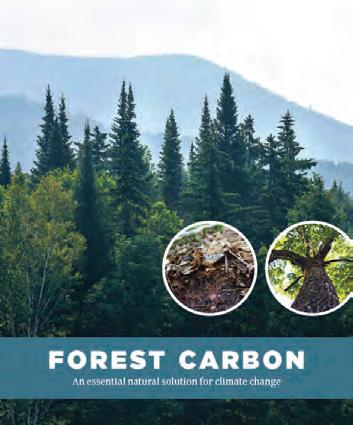
n d how the management decisions we make i n f l u e n c e t h i s c r i t i c a l f o r e s t b e n e f i t D’Amato is the professor of Silviculture and Applied Forest Ecology and Director of the Forestry Program at the University of Vermont. Tony is co-author of Forest
B u i l d i n g c o n s t r u c t i o n i s a s i g n i f i c a n t contributor to greenhouse gas emissions driving climate change Can wood local w o o d p r o v i d e a n a l t e r n a t i v e ? C r o s s Laminated Timber (CLT), a type of mass timber, is a “new” wood building product that is touted as a substitute for foss i l - f u e l - i n t e n s i v e b u i l d i n g m a t e r ia l s s u c h a s c o nc r e t e a n d s t e e l . T h e r e i s t r e m e nd o u s p o t e n t i a l for CLT to reduce t h e c a r b o n f o o tprint of buildings w h i l e b e n e f i t i n g the regional New E n g l a n d f o r e s t e c o n o m y C o m e f i n d o u t w h y C LT i s v i e w e d a s a p r o m i s i n g b u i l d i n g p r o d u c t , w h a t the status of CLT made from local wood species is, and why you should care Hint: Mass timber is carbon storage! Presented b y U N H C o o p e r a t i v e E x t e n s i o n F o r e s t Industry Specialist Andy Fast.
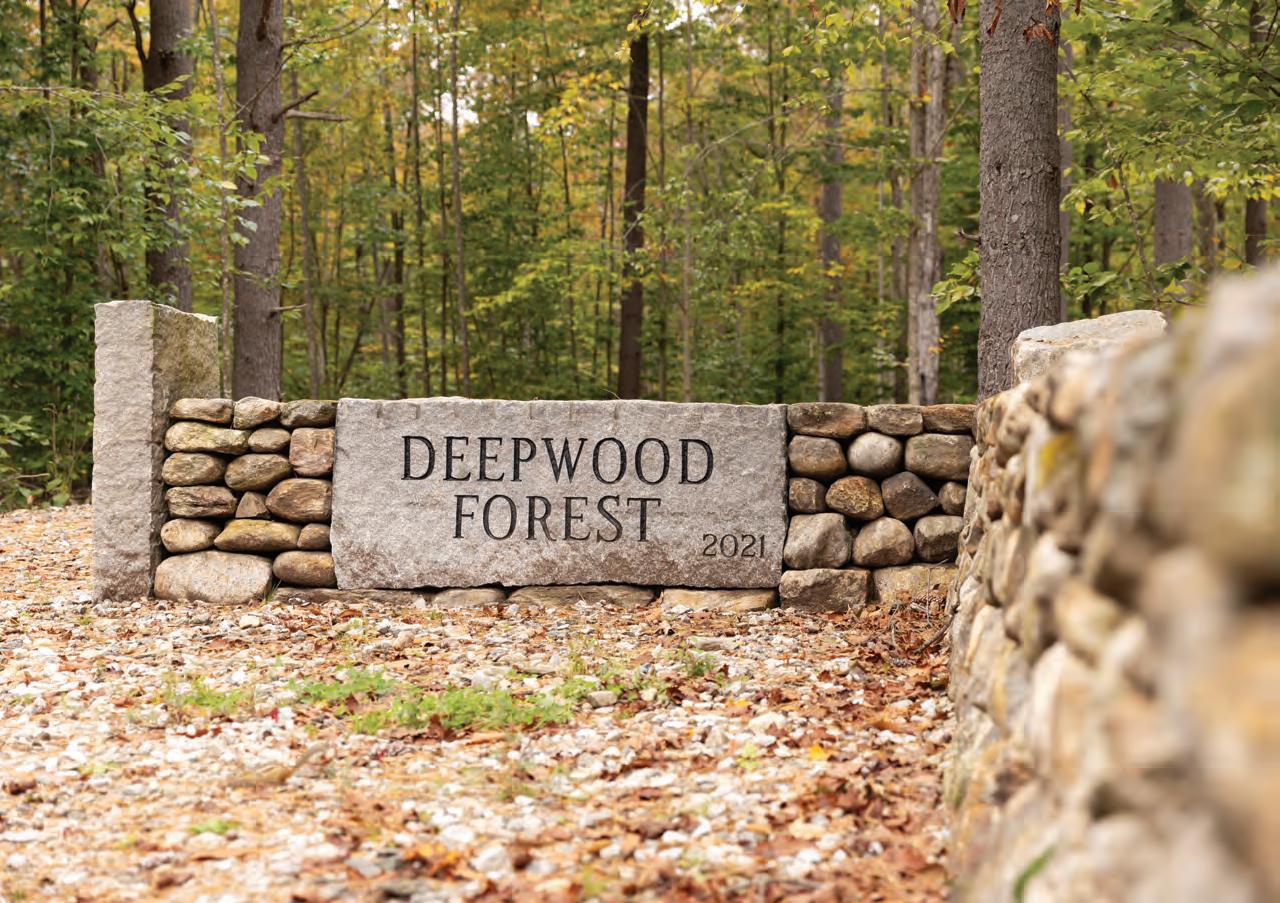
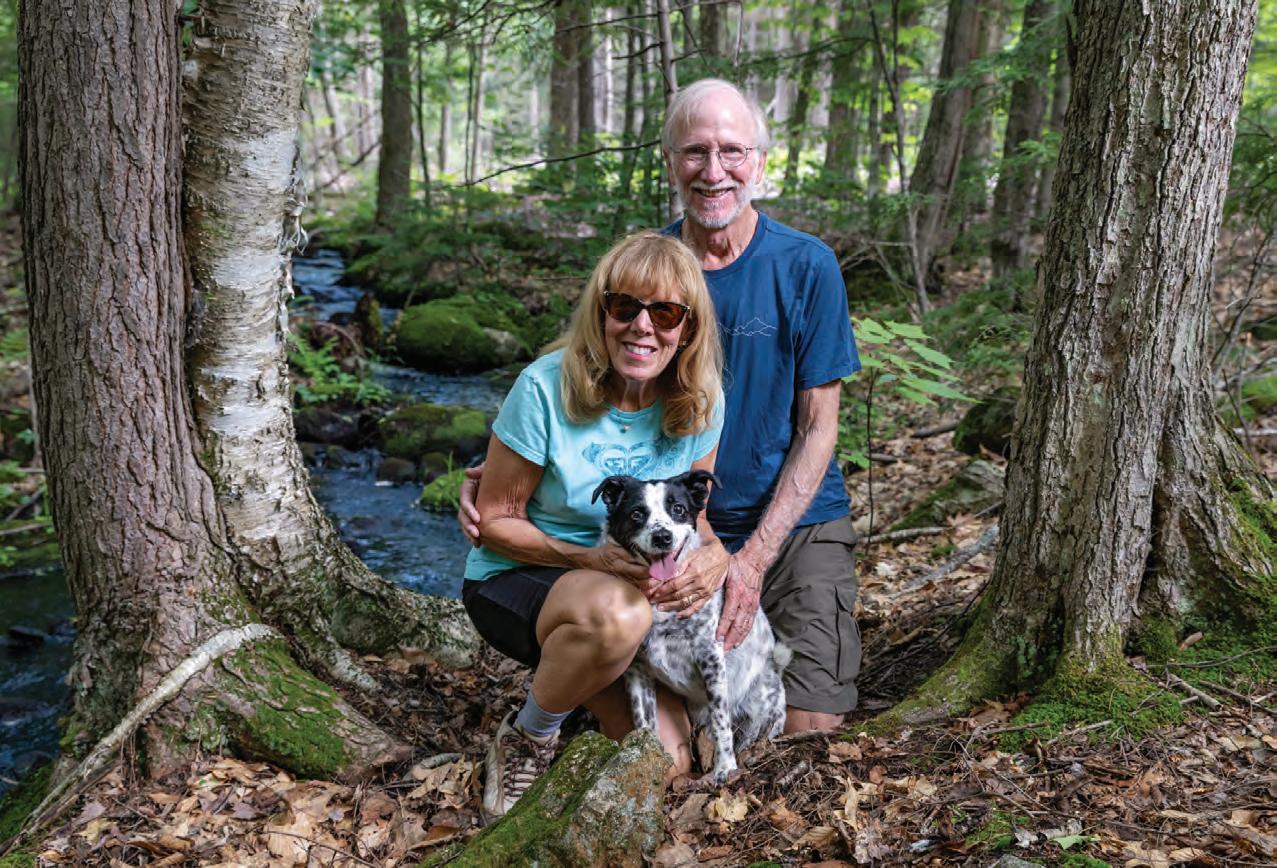
In Januar y 2024, the Forest Society teamed up with Ken and Ilene Stern to protect nearly 400 acres in Canterbury and Northfield with a conser vation easement Known as Deepwood Forest, this conservation success was made possible thanks to a generous gift by the Stern family as well as support from local grants and foundations
Located on a highland ridge between northeast Canterbury and southeast Northfield, the property features several beaver ponds, perennial streams, vernal pools, black gum swamps, forests, and ledge outcrops, which host a variety of wildlife, including black bear, moose, Eastern coyote, red fox, gray fox, bobcat, otter, mink, fisher, ermine, and dozens of neo-tropical migrator y bird species The New Hampshire Fish and Game
Wildlife Action Plan lists the property’s habitat as among the highest-ranked in the state due to its natural features and surrounding undeveloped forests.
The Stern family envisions Deepwood Forest as a community resource, open to the public for walking, hiking, snowshoeing, and nature observation “The three and a half miles of trails we designed and created provide a range of opportunities for people,” Ken Stern says “Some trails are relatively short, level, and smooth, while others lead the adventurous to remote areas high in the hills ”
The Stern family manages the forest with help from a Forest Stewardship Plan, with the goals of maintaining a healthy forest and vibrant wildlife habitat and providing a welcoming
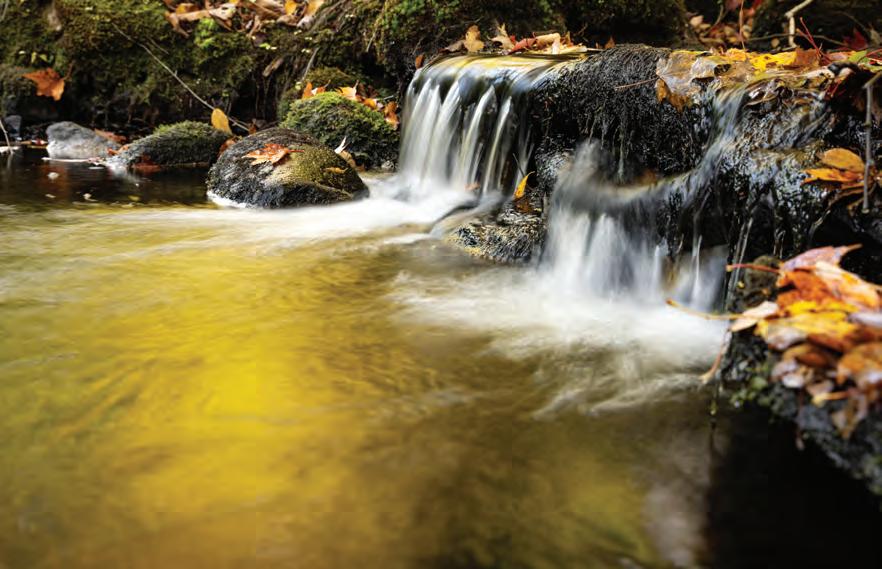
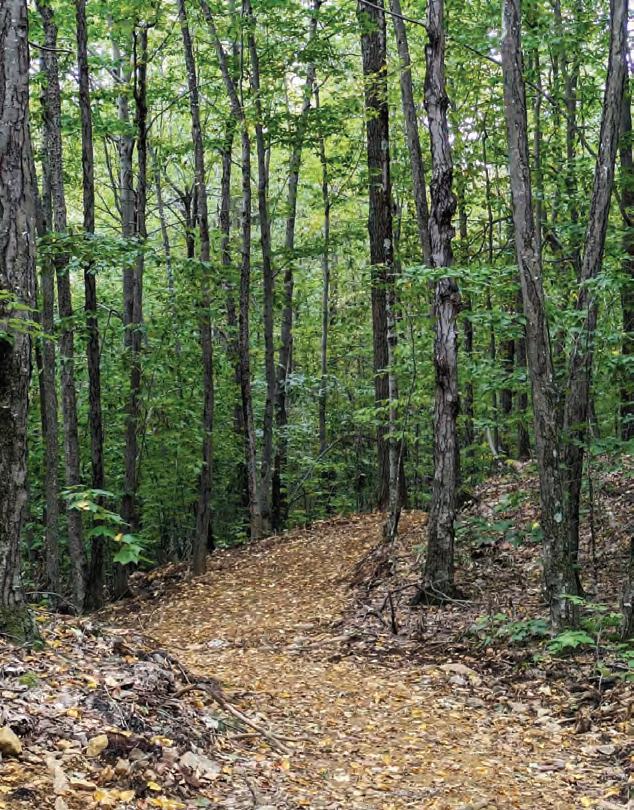
place for outdoor enthusiasts “The creation of Deepwood Forest encompasses much of what I have learned about the land’s past, present, and potential future,” Ken says. “It was our goal for our community and region to have a special place to enjoy, which now will be conserved forever. Our gift to the community will provide a place for nature to thrive and where people can explore and learn from their experiences ”
In early January, Forest Notes caught up with Ken to learn more about Deepwood Forest and his and Ilene’s commitment to protecting it forever
Forest Notes: What inspired you to work in conservation?
Ken Stern: When I was a teenager, I went to a summer camp in Maine and often went hiking and camping in the White Mountains It was great fun I did not realize the impression it made on me until nearly 15 years later when I moved to New
Hampshire in 1977. I went for a walk in the woods, and it all seemed so familiar The sights, sounds, smells, and tranquility resonated with me. From that time on, I knew New Hampshire would be my home I have been walking and working in the woods ever since
Perhaps the biggest boost to my conservation experience and motivation was working at the Forest Society as the director of easement stewardship for 10 years. Working with the Forest Society exposed me to so many wonderful people who had conserved thousands of precious acres. Meeting these landowners and experiencing their joy and satisfaction in conserving their property was inspiring I have been involved in the Canterbury Conservation Commission for years and active with my local land trust.
FN: How and when did you find this property and decide it was worth conserving?
KS: This is a short stor y with a long background I have been exploring the forests of Canterbur y since the early ‘80s. Back then it was by map and compass I would take a topographic map and decide to explore a new area where I had never been. Part of the challenge was going out into the woods and then finding my way back to the car It was ver y different without a GPS Canterbury is a wonderful town with lots of outdoor space. High ground, extensive wetlands, snowmobile trails, class VI roads, and many acres of unbroken forest are abundant. I have always been thrilled by the idea that you could walk in the woods anywhere, as long as it was not posted
One of the things that motivated me to enter the field of land conser vation was seeing large parcels of land broken up into house lots with posted signs going up along the class VI roads. I grew up in a suburban area that had limited open space when I was a child and eventually everything that was not conserved was developed.
The idea of permanently conserving open space has intrigued me throughout my life. So little in life is permanent; everything

changes. After decades of walking the woods, Ilene and I found this property It had everything we were looking for:
• A very large place that provided the opportunity for “getting lost in the woods ”
• It was large enough to include long walking trails over varying terrain with interesting sights along the way
• The forest had not been abused by prior aggressive forest management
• It was scenic with mature trees of various species
• The property was diverse with ledges, beaver ponds, streams, stone walls, and even a cellar hole and cemeter y from the early settlers. Red oak, white pine, hemlock, yellow birch, maple, and more species are found throughout
• The forest was large enough that we could practice a variety of management strategies to achieve multiple goals for both forestry and wildlife
• And it was in our town, close to home.
When the property came on the market, we decided that this was the place We bought it from a logger who was interested in harvesting it for investment and then selling it as one or two estate lots We negotiated with him and he agreed to close the deal while they were in the midst of the harvest.
KS: I spent much of my life in the woods, managing property and seeing how and what other landowners have done This provided a sound basis for developing our management plan. I had been thinking about managing property for years before we purchased this parcel.
Our management plan anticipates several zones to accommodate different goals:
• One zone will be maintained as open meadow to support pollinators, small mammals, and the predators that rely upon them.
• One zone will be maintained as early successional forest This is a habitat in short supply that supports a wide range of animals that were once common and are now in declining numbers
The Sterns and the Forest Society are hosting a guided naturalist hike this spring at Deepwood Forest. More details will be available soon at forestsociety.org/events.


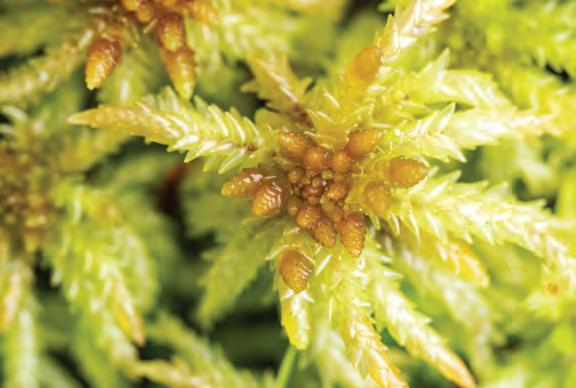

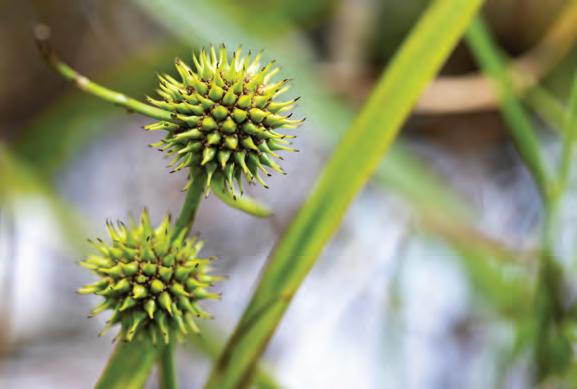

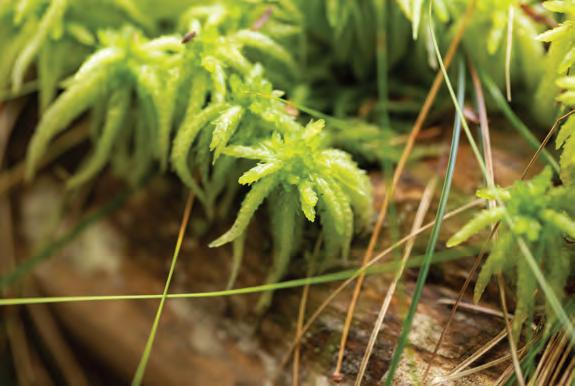


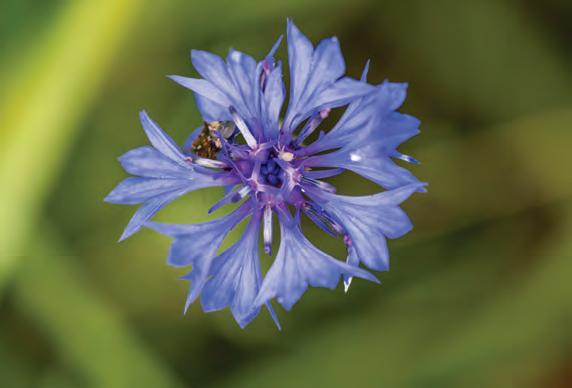
• One zone will be managed for sustainable production of forest products. We all need wood for heat, flooring, furniture, and other goods The production of these goods also supports the local economy by providing work for loggers, truckers, and land managers
• O n e z o n e w i l l b e l e f t a l o n e , t o m a t u r e , a n d h o p e f u l l y


someday to evolve into an old growth habitat This zone will protect some of the most rare and ecologically sensitive natural communities on the property.
• T h e m a n a g e m e n t o f a l l t h e z o n e s w i l l w o r k t o g e t h e r, symbiotically, to support wildlife and outdoor recreation and provide clean air and clean water.
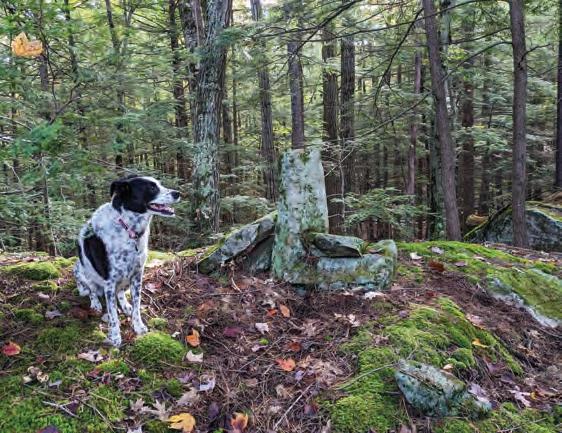
FN: Why is conservation important to you and why should other people care about conserving land?
KS: Land supports life. It provides our air, water, food, and fiber. Keeping a portion of our town, state, and country undeveloped will help our society and the natural world sur vive the many challenges we face now and in the future
FN: What makes Deepwood Forest special to you?
KS: The opportunities are endless I’ve enjoyed the opportunity to explore the unknown and discover new areas of interest. I remember while walking with our sur veyor we discovered a town line monument with a stone standing on end on top of a ledge outcrop with dates and initials carved by surveyors in the 1800s It was an amazing experience
I’ve also enjoyed the opportunity to lay out and create new hiking trails, which Ilene and I can enjoy and share with others There’s also been the opportunity to establish varied habitats for wildlife. Most importantly, it’s simply having the opportunity to experience the beauty and tranquility of nature and relish the peace and joy that come from being in the forest.
FN: What do you hope visitors will think and feel as they experience Deepwood Forest?
KS: We hope they enjoy being outdoors, have fun exploring a new place, and feel comfort walking a familiar trail. This is a place where visitors can relieve the stresses of life with the rhythm of their footsteps and marvel at wildlife and the beauty of nature
FN: How does it feel knowing this land will benefit people and wildlife forever?
KS: We feel tremendous satisfaction having accomplished the creation of a permanent conservation area to be enjoyed by our friends and neighbors, and for future generations, forever. There is also a deep joy in knowing that a piece of the natural world will remain to evolve and support the full spectrum of life.
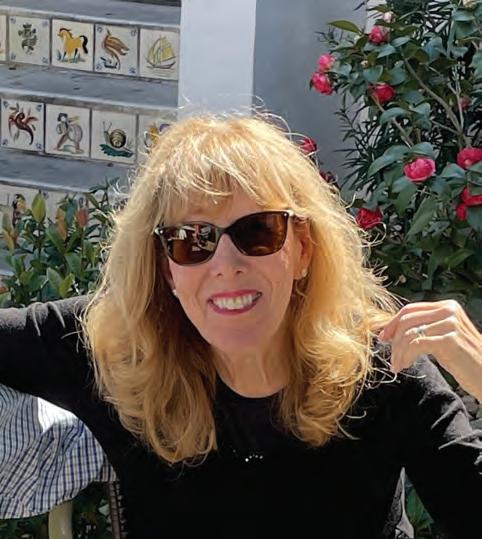

“A special accomplishment that Ken and I have always envisioned was to create a personal legacy to our town of Canterbury and its surrounding areas. We desired to make a difference in people’s lives, while at the same time, enriching the community in a healthy and active way.
We were fortunate to find a beautiful piece of land that would allow us to fulfill this dream with a positive outcome, allowing people to peruse a very special place “in our own backyards.”
Experiencing the unique beauty of Canterbury for over 40 years led to the desire to make this land accessible for others to enjoy for many years to come. My professional experience has always been in a helping profession and the joy of giving is something that has always been a lifetime fulfillment for me.
Thank you to my husband, Ken, for pursuing this dream and making it come true. “
Ilene Stern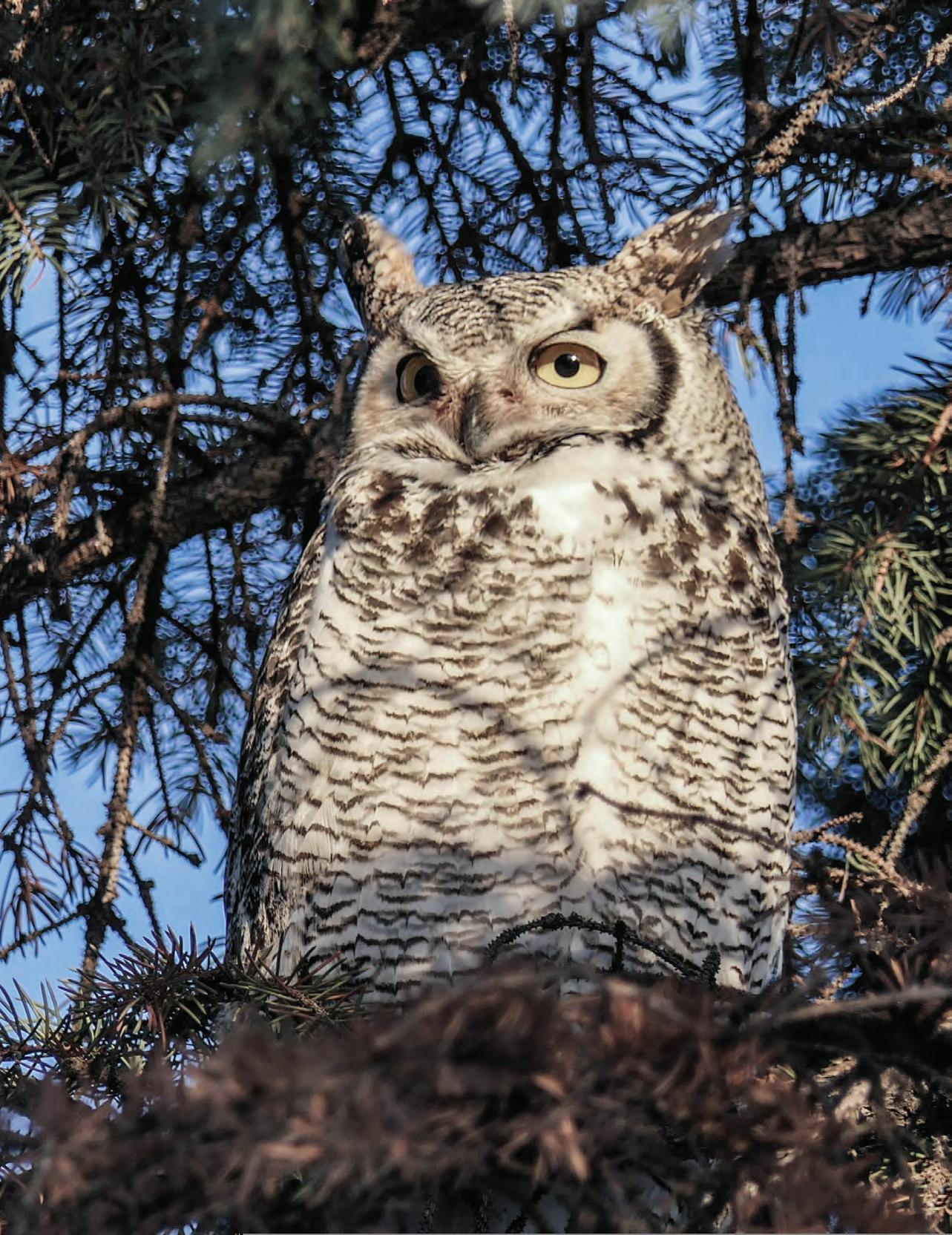 Great horned owl | Photo: Wayne Linton
Great horned owl | Photo: Wayne Linton
 By Carrie Deegan
By Carrie Deegan
Whenever I am lucky enough to encounter a wild owl, my body does something strange Some unconscious reflex causes me to freeze and hold my breath for as long as the moment lasts, I’m locked there, watching or listening to see what this solemn, otherworldly creature will do next
There are at least seven species of owl commonly found in New Hampshire and winter is a great time to encounter several of them if you know how and where to look. A few, like the shorteared owl (Asio flammeus) can be seen during daylight hours, flying low over fields and coastal marshes hunting for rodent prey. In some winters, our coastal areas are also graced with a few juvenile snowy owls (Bubo scandiacus) journeying south to New England from their Arctic breeding grounds. When these seasonal “irruptions” happen, it is usually following a summer where Arctic lemming populations, the owls’ preferred food, were abundant and many young owls fledged to disperse southward Since 2023 was reported to be a very poor breeding season
for snowy owls, prospects for snowy owl sightings this winter in New Hampshire are unfortunately also poor.
One of the best ways to encounter an owl in winter is to try for one of our common nocturnal owls on an “owling” excursion Great horned owls (Bubo virginianus) and barred owls (Strix varia) are both active and vocal in New Hampshire’s forests during the coldest months, as winter is the heart of their breeding season. Great horned owls begin establishing nesting territories in Januar y and will vocalize to defend perimeters and communicate with their mates Barred owls begin their courtship a bit later (mid-Februar y, typically), but they tend to be even more vocal than great horned owls and less timid around humans and human habitations. It’s not uncommon to see a barred owl hanging out adjacent to bird feeders or chicken coops in winter, especially if a crusty snowpack makes it difficult to hunt for rodents in more “natural” surroundings. A winter owling excursion for either of these species can be a unique and rewarding experience
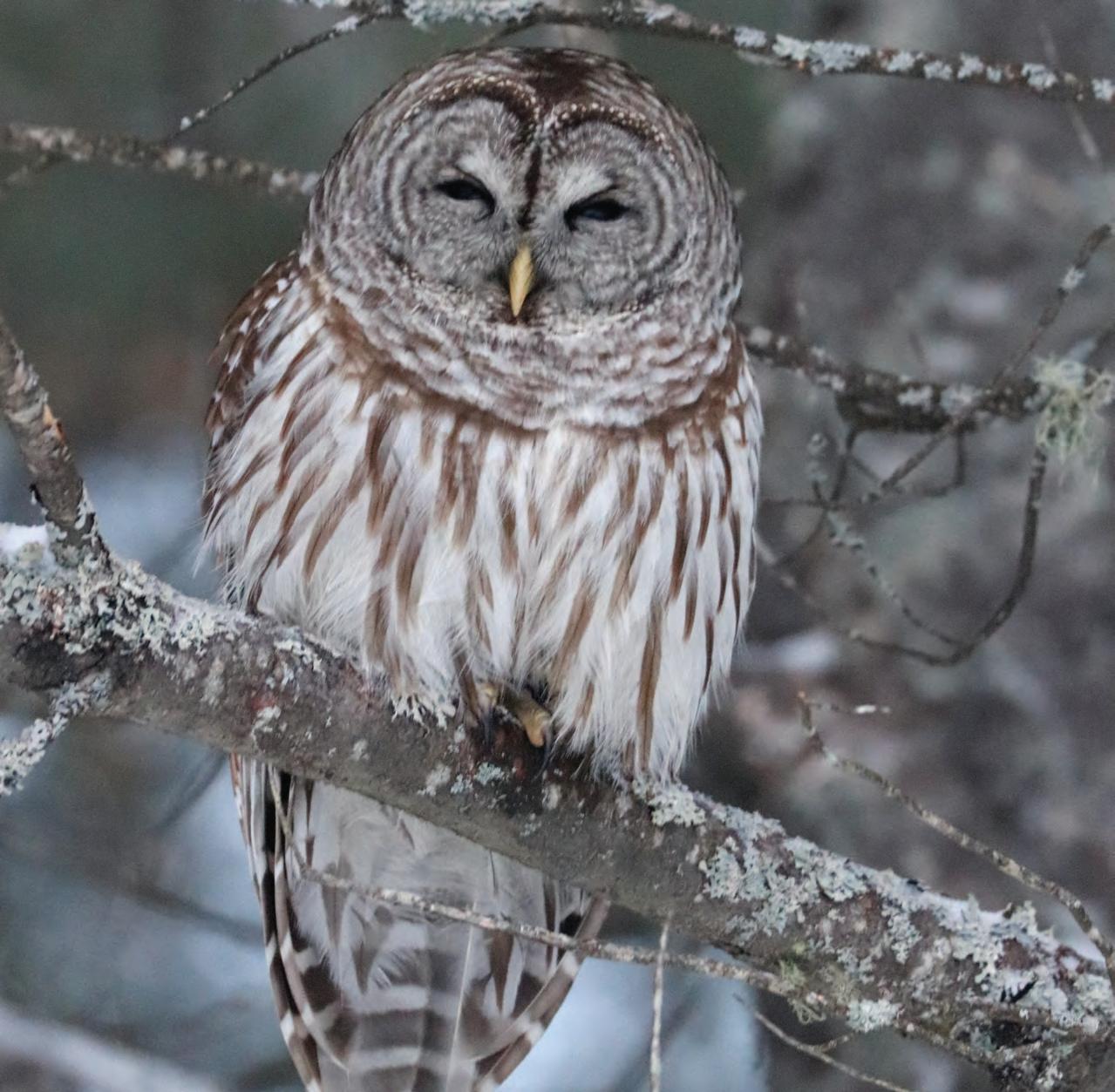
Imagine bundling up on a moonlit winter night, stepping out into the cold stillness with your boots crunching softly through new fallen snow, heading for a stand of trees in the distance Trust me when I tell you that just this part (without any owls) can be a magical experience. As Lorus and Margery Milne describe in their 1956 classic, The World of Night,
“When snow crystals reflect a moon nearly full, the land between the horizons is like a crumpled disk of white paper with man in the middle The frozen water crystals glitter, some of them almost as bright as the stars…It is sunlight twice mirrored, once by the moon, and again by the cold blanket which mounds over low plants and lies in drifts among the trees.”
This extraordinary realm is the setting for your owling adventure.
Choose a perfect night.
A still, clear evening with some moonlight is best Let your eyes adjust to the darkness as you head out (this can take a full 20–30 minutes, so be patient) and tr y not to use any flashlights or headlamps
Don’t invite a crowd.
The chances of an owl encounter decrease sharply as the number of people in your owling party increase. One or two people is the absolute best calculus for owl encounters
Locate potential owl habitat.
Wetlands and fields where they meet forest edges are excellent areas to try, as well as anywhere with plenty of standing dead trees that may present nesting opportunities for owls.
Be as quiet as possible.
Don’t talk and try to walk as quietly as you can As the child in Jane Yolen’s famous children’s book Owl Moon explains, “When you go owling, you have to be quiet.”
When you reach your habitat, just be still.
This is the hardest part, says Sarah Kern, Forest Society education coordinator and co-founder of Tailwinds, a New Hampshirebased raptor education and conser vation organization. “You just want to sit in one spot and not move or speak for about 20 minutes. Find a tree you can lean against and get comfy.”
Reach out via call.
Once you’ve been quiet and still for as long as you can, try hooting out the call of a great horned or barred owl It’s best to practice this at home first and you can use a recorded call if you find you’re a hopeless hooter. After you call once, be quiet again for a few minutes and listen intently to see if you get a response Don’t overdo it
Owls have a finite amount of energy, especially in winter, and when we call them in or watch them, even from afar, we are altering their normal behavior patterns and expending their energy reser ves. For that reason, limit your owling excursion to a half hour or so, and don’t repeat it on successive nights, especially if you’re successful!
“The truth is, owling can be even easier than that,” says Kern “You can just sit on your back porch. It doesn’t matter if you’re in Portsmouth, Bedford, or Concord if there is some sort of woodlot somewhere near you, you could absolutely hear an owl calling in winter! Because our windows are typically closed this time of year in our well-insulated houses, we really miss out on a lot of the chatter going on out there.”
In the stor y Owl Moon, a great horned owl glides in and perches in a nearby tree to investigate the father’s imitated owl call, the pinnacle of owling aspirations. As the book befittingly concludes, “When you go owling, you don’t need words or warm or anything but hope… the kind of hope that flies on silent wings under a shining Owl Moon ”
Carrie Deegan is reservation stewardship & engagement director for the Forest Society

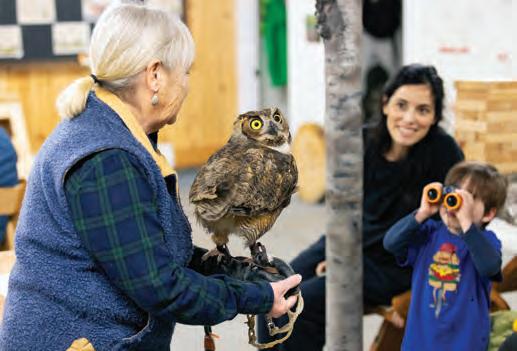

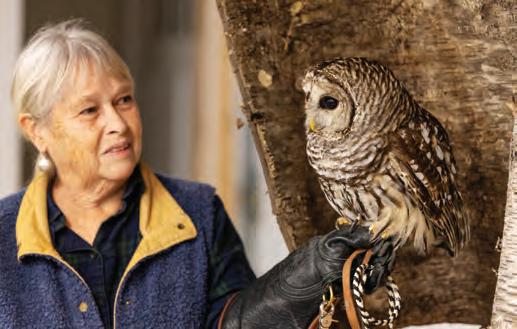

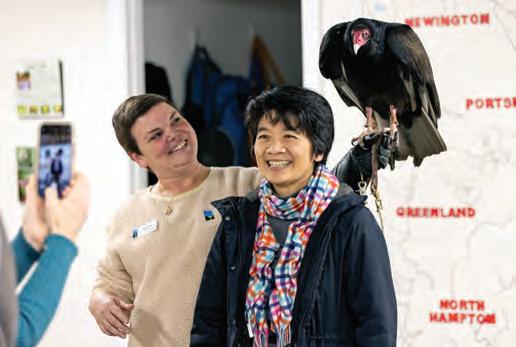
From top: Tailwinds co-founder and director Linda Noon presents Henry, a great-horned owl, and George, a barred owl, during a program at Creek Farm Co-founder and education lead Sarah Kern perches Tailwinds’ turkey vulture, Greta, behind a program participant for a photo.
Looking to get up close and personal with raptors? The Forest Society par tners with Tailwinds: Raptor Education and Conservation based in Kensington, N H , to offer educational programs with their team of non-releasable raptors at Forest Society proper ties, including Creek Farm in Por tsmouth
Tailwinds was founded by three women who believe that environmental and conser vation education programming is imperative to creating an environmentally literate community.
To learn more about upcoming programming, visit tailwinds.live or follow them at @tailwindsnh on Facebook and Instagram
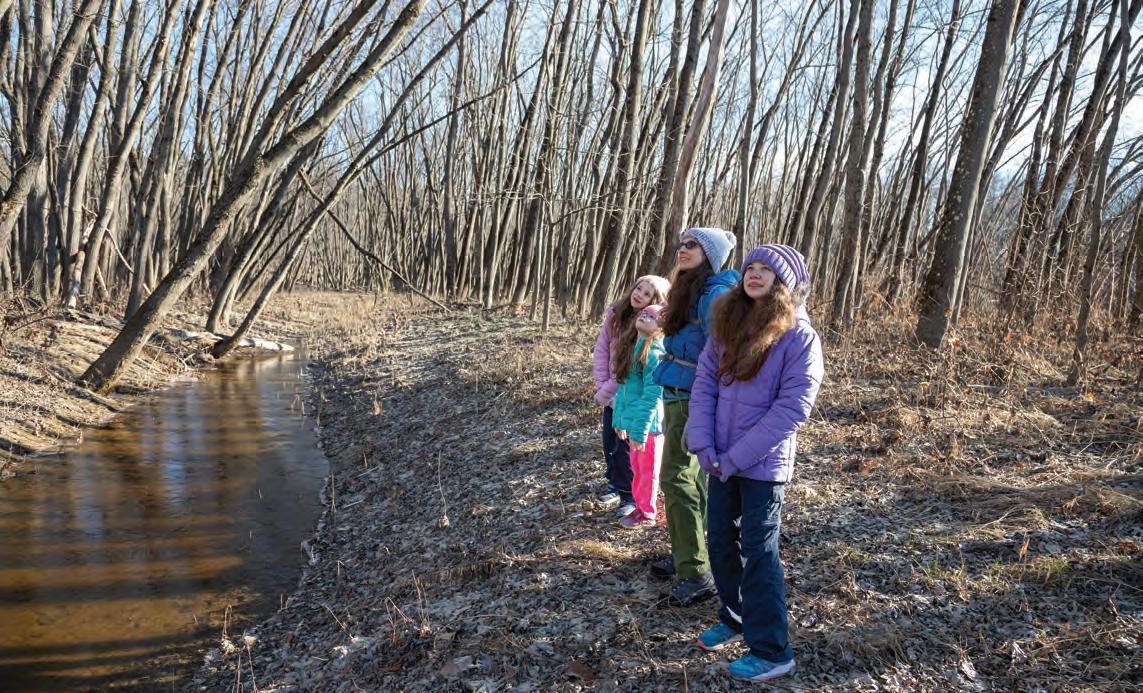
My three young daughters have a stuffed bear named Acorn In the winter, they put her in a box to let her hibernate My family tends to hibernate during the colder months, too, but I don’t want this to be the case. As a nature photographer, I’m trying to raise outdoor kids steeped in naturalist education But the lengthy process of getting five people packed and layered is a deterrent So is that initial blast of nostril-freezing air How could we get the kids, and, ahem, adults motivated to get out more this winter to keep the experiential education going? Our answer was to create outdoor games that appealed to our mutual interests Here are a few ideas to try on Forest Society properties that have worked for us.
My kids don’t always lack winter enthusiasm In fact, the opposite is true during a snowstorm. All I hear is, “Can we go outside?” But all they want to do is sled, build snowmen, and throw snowballs All of this is great and to be encouraged, but was there a way to connect this excitement for fresh snow to naturalist education? I found an answer one day when I proposed a guessing game What animal tracks could we find in the many acres of woods behind our house? This suggestion got my kids to abandon their snow fort in the yard and rush into our woods blurting out guesses I brought along a card with pictures and m e a s u r e m e n t s o f v a r i o u s a n i m a l t r a c k s to help us identify what we found Some were easy, like deer and wild turkey. But
others were more difficult. What was the o n e w i t h fi v e t o e s i n s t e a d o f f o u r l i k e canine or cat species? After taking meas u r e m e n t s , w e r e a l i z e d i t w a s a fi s h e r ! We explored many Forest Society properties, including Morse Preser ve in Alton, Hay Reser vation in Newbur y, and Weeks Woods in Gilford, and at each property we found different tracks.
But what if there is no snow? Try creating a naturalist scavenger hunt game Make a winter-themed deck of index cards with things that can be found in nature. The cards could be literal like “pinecone” or “icicle,” or a concept like “something big” or “a triangle ” There are many variations of how to proceed with the actual scavenger hunt. We like a “Find and Seek”
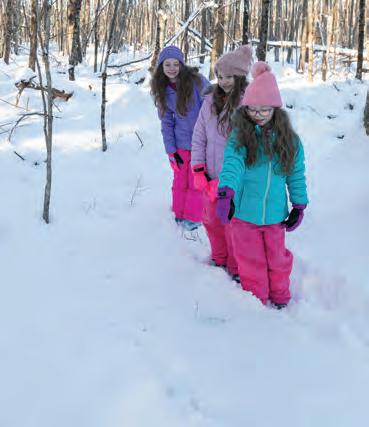

Left: When the conditions are right, animal tracking is a great way to teach kids about wildlife activity in their own backyard.
Right: Ice formations are always a kid-favorite scavenger hunt item.
version where we give each child a third of the cards and their task is to call out when they find something that fits a card as we move through the forest The first player to get through all her cards wins! We recently visited the Forest Society’s Merrimack River Outdoor Education and Conservation Area in Concord and this was an excellent place for this game There was no snow but there were many ice patterns in the flooded areas that added imaginative options for the conceptual cards Our game led to learning One of my daughters noticed big piles of chewed pinecones and correctly guessed they were made by squirrels. At home, we learned they are called squirrel middens. Squirrels return to the same place to eat and build up these big piles over time. They don’t collect every seed, so they help plant the next generation of trees with the ones they miss.
Continuing with the theme of friendly competition, another game is to have a winter birding contest My family has gotten more into formal birding and are keeping life lists For 2024, we agreed to write down ever y species each of us obser ves and see who could get the most by the end of the winter Winter is a time when many species have migrated away, but we knew we could utilize the diversity of habitats at Forest Society properties to expand our
winter birding list beyond the common backyard birds The open saltwater habitat at Creek Farm in Portsmouth has various gulls and winter waterfowl like scoters, bufflehead, and loons that we can’t find near our inland home. Dame Forest in New Durham has wetlands with many dead trees that attract pileated, red-bell i e d , d o w
s Common goldeneye ducks and bald eagles spend their winter on the Merrimack River in Concord and we were excited to find them on our aforementioned outing. Our birding contest gets us out more often and teaches us that each species needs a different habitat to survive the winter.
You could create many other games that integrate your particular interests M a k i n g t h e m u p i s h a l f t h e f u n . O u r games sparked curiosity and questions in our kids that led to learning and a greater appreciation for the value of conser ving land We feel more motivated to continue our mission to raise outdoor kids through the winter Acorn the bear still stays in her box, though.
John Welch is an educator and photographer who resides with his wife and three children in central New Hampshire To see more of his work, visit jwelchphoto.com.
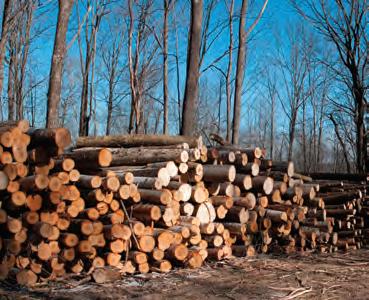
The Forest Society encourages landowners to consult with a licensed forester before under taking land management activities. The following are paid adver tisers.
Calhoun & Cor win Forestr y, LLC
Realize what you value the most in your forest Ser ving individual, municipal, state, non-government, and industr y forest owners
41 Pine St., Peterborough, NH 03458 • 603-562-5620
Email: swiftcor win@gmail com
Full Circle Forestr y, LLC
Ehrhard Frost, NHLPF #103, Thetford Center, V T 802-785-4749 • efrost fc f@gmail com
Eric Radlof, NHLPF #447, Antrim, NH 603-321-3482 • eradlof fc f@gmail com
Jeffrey Snitkin, NHLPF #452, Newbur y, NH 802-310-0292 • jsnitkin.fc f@gmail.com
Benjamin Vicere, NHLPF #453, Springfield, V T 802-779-7021 • bvicere fc f@gmail com
We specialize in creative, ecological approaches to forest management that are designed to provide longterm economic and intangible benefits to landowners and their forests. FCF par tners are licensed foresters, NRCS Technical Ser vice Providers, pesticide applicators, and Tree Farm Inspectors
752 Rt 103A Newbur y, NH 03255 • 802-310-0292
Mar tin Forestr y Consulting, LLC
Offering complete forest management services, including timber sales, cruises, appraisals, and wildlife habitat management Ask us about recreation trail planning, construction, Brontosaurus mowing, and forestr y excavation ser vices
P.O. Box 89, New Hampton, NH 03256 • 603-744-9484 Email: mar tinforestr y@gmail com
Meadowsend Consulting Company
Quality Consulting Forestr y with Integrity Guaranteed
Jeremy Turner, NHLPF #318 Southern NH jturner@meadowsendco com
Matthias Nevins, NHLPF #518 Central NH mnevins@meadowsendco.com
Ryan Kilborn, NHLPF #442 Nor thern NH rkilborn@meadowsendco com
Vast range of quality land management ser vices Connect with us for a free site consultation! meadowsendco com • 603 526 8686
Licensed foresters should address inquiries about advertising to Anne Truslow by calling 603-224-9945 or emailing atruslow@forestsociety.org.

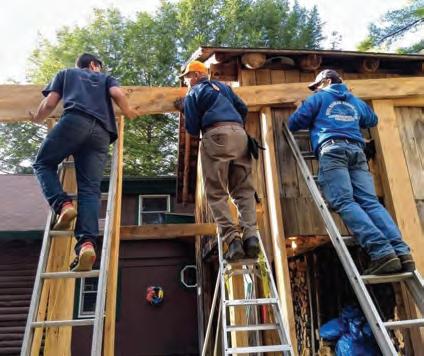
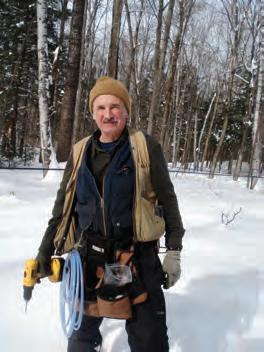
Editor’s note: As a membership organization, the Forest Society relies on dedicated supporters for their knowledge, their investment of time and expertise, their diverse and passionate voices, and their consistent financial support Without our members, we would find ourselves, well, up a tree.
In 2023, Peter and Debbie Rhoades met the milestone of becoming 50-year members of the Forest Society. Their story of connection to people and place embodies the mission of the Forest Society.
On a hilltop in Alstead, N H , surrounded by a fragrant red pine forest, Peter and Debbie Rhoades are baking a cinnamon coffee cake in their New England log cabin As I pull into their driveway, inhaling vanilla and wood smoke, I wonder when is considered too soon to ask if I can move in Peter built this cabin from the ground up, following in the footsteps of his father a n d g r a n d f a t h e r b e f o r e h i m , w h o a l s o homesteaded their land with their capable hands The hand-hewn timbers were felled from the very forest that covers the
property and even the brick chimney was laid by hand
“The main thing that’s kept me here is the land we’re on has been in the family for over a century. My great-grandfather bought it in 1902 and my grandfather continued to acquire additional land around it,” Peter says, as we enjoy the aforementioned coffee cake on the couple’s porch
The Rhoades’s land covers 312 acres, in 9 separate parcels, not including the additional 238 acres that members of Peter’s nearby extended family own Debbie and Peter manage the entire 550 acres for timber and, in winter, they manage an independent maple sugaring operation that at one point consisted of 5,300 tapped trees. During their ownership of the land, 1 75 million board feet of timber have been cut. Debbie runs the skidder.
It’s Peter’s long ties to this land that first inspired him to become involved in managing it As a kid, he started with 4H and grew Christmas trees in the front field of his childhood home as a forestry project But it wasn’t until his junior year of high school that he realized that forestry
could be a career path after he won first place at the University of New Hampshire 4H Forestr y Field Day. “If there was one catalyst that steered me towards forestry, it was probably that,” he says
W h e n D e b b i e i s n ’t d r i v i n g t h e c o uple’s 1965 skidder or working the sugaring operation, she is running her own professional gardening business. She got into gardening as a career in her 30s and has continued ever since In fact, after our conversation and coffee cake snack, she is heading off to Marlow to prepare the Christmas Tree Inn flower beds for winter. “I’m so glad [I took up gardening],” she says, “Peter and I find that what we do for work coincides really well. And what we do in the woods has a lot of influence on the gardens and how they’re set up.”
Like Peter, Debbie spent much of her childhood in the woods She grew up down the street from where Peter spent his youth, helping her father with his own sugaring operation with the rest of her siblings.
The couple’s shared early memories of spending time outdoors has also helped to shape the way they raised their family.
Their own children grew up on this property, splitting logs, hauling sap buckets, and learning the ways of the woods just as their parents had Even their grandkids are absorbing a love for the outdoors when t h e y c o m e f o r d i n n e r e v e r y T h u r s d a y night. “The kids have been raised with the same values we have,” Debbie says “They associate the land with us ”
The Rhoades joined the Forest Society in its early days, when there were only six employees in an office on N State Street in Concord They were both inspired by their desire to get current use policies in p l a c e , n o t o n l y f o r t h e i r l a n d b u t o t h e r parcels like it. “Keeping open land open is probably the most important, but keepi n g t h e l a n d i n p r o d u c t i v e f o r e s t m a nagement is what makes the Forest Society i m p o r t a n t t o u s , ” P e t e r s a y s “ We h a v e t h e s a t i s f a c t i o n o f s e e i n g [ t h e r e s u l t o f ] more than fifty years of effort we’ve put i n t o t h e l a n d . We c a n s e e t h e c h a n g e s that come about.”
In his career as a forester, Peter bore witness to a lifetime of good forest management. He has personally assisted others in setting up easements on their land and advocated for their effectiveness, managed multiple town forests, including nearly 5,000 acres of conservation land, and led educational tours of his own land to help fellow landowners learn best-management practices “The forests are an integral part of everything that is important to us,” he says “They clean the air we breathe; they soak up CO2; they create a sense of wellbeing for the people who take the time to spend time in the trees ”
B e t w e e n t h e i r c e n t u r i e s - o l d m a p l e operation, Peter’s decades of stewarding the land, and Debbie’s work as a professional gardener, the couple has done more than just spend time in the woods They have let it become part of them. Even Debbie’s handmade colorful patchwork quilts, stacked on the couch to be brought to charity shelters across the state, have

absorbed the smell of wood smoke that wafts through the cabin.
“We just wouldn’t be who we are without living here,” she says. “And I want the kids and grandkids to understand what we do, get a notion of why it’s important, and why it needs to continue ”
I spent almost five hours on their property. In that time, it became clear that there are two kinds of people living in our state: people who live in New Hampshire and people who live New Hampshire The latter built our histor y; passed our traditions on; they love the land because they are the land
The Rhoades belong to the latter type o f p e o p l e I t ’s e v i d e n t f r o m t h e fi n g e rp r i n t s t h e y h a v e l e f t a c r o s s t h e i r h u ndreds of acres, the way Peter pronounces “ g r a n d f a t h e r, ” t h e t o w n r o a d m a r k e r that bears their last name. Without families like this one, the landscape of New H a m p s h i r e fi g u r a t i v e l y a n d l i t e r a l l y wouldn’t be the same











Increasingly, policy makers, landowners, and members of the public are r e c o g n i z i n g t h e r o l e f o r e s t s p l a y i n m i t i g a t i n g t h e d a m a g i n g e f f e c t s o f c l imate change. By sequestering and storing the greenhouse gases society is emitting, forests are uniquely positioned to help address this crisis while the world works to decarbonize our economies
E n s u r i n g t h e y c a n p r o v i d e t h i s c r ucial benefit requires all stakeholders to keep New Hampshire’s forests as forests. Forest carbon markets, where landowners follow different management approaches to increase carbon stocks on their land, are viewed by some advocates as a forcef u l r e s p o n s e t o c l i m a t e c h a n g e a n d a s one way for private forest landowners to help contribute to the reduction of atmospheric carbon. In addition, by selling the carbon stored in their forestland, they can generate income that in turn helps them meet their financial obligations thereby helping to keep their forests as forests
The Forest Society does not view voluntar y carbon markets as the only solution to solving the climate change crisis. Instead, they are another tool that forestland owners can choose to use to help them address climate change while providing an alternate source of revenue to manage their lands. Public policy should not restrict landowners from using this tool nor should public policy promote them in ways that undermine sustainable management practices like those used by the Forest Society.
However, voluntary forest carbon mark e t s h a v e b e e n t h e f o c u s o f c r i t i c i s m Among the concerns raised are:
1. Do they allow the buyers of carbon credits (the companies emitting greenh o u s e g a s e s ) t o “ g r e e n w a s h ” t h e i r business practices in order to appear m o r e e n v i r o n m e n t a l l y f r i e n d l y ?
2 Is there an actual climate change benefit that will result from forest carbon m a r k e t s ? Wi l l t h e y h e l p t h e w o r l d limit the global temperature increase to 1.5°C (equivalent to 2.7°F) as called for by the Intergovernmental Panel on Climate Change?
3 These markets rely on the assumption that enrolling lands will change t h e p l a n n e d m a n a g e m e n t , t h e r e b y r e s u l t i n g i n a n i n c r e a s e i n c a r b o n stocks How will the markets ensure the claimed reduction in greenhouse gas emissions from a specific project is above and beyond would have happened without that project? In other words, is there true additionality?
4. What will be the effect on the forest p r o d u c t s i n d u s t r y ? Wi l l t h e s e p r og r a m s r e s u l t i n l e s s t i m b e r g e t t i n g into regional and local markets or an erosion in the infrastructure which supports this sector?
5. Carbon is stored in wood products. Wi l l t h e s e m a r k e t s a p p r o p r i a t e l y a c k n o w l e d g e t h a t f a c t , e s p e c i a l l y when the carbon embedded in these p r o d u c t s d i s p l a c e s t h o s e m a n u f a ctured from carbon-intensive material like steel and concrete?
6. Wi l l a n i n c r e a s e i n l a n d o w n e r s enrolling their current use properties i n t h e s e m a r k e t s r e s u l t i n p r o p o sals to amend the current use statute b y t h o s e w h o d o n o t b e l i e v e l a n d e n r o l l e d i n c a r b o n m a r k e t s s h o u l d qualify for current use?
7 Will the pro-forestation movement point to the management practices called for in forest carbon markets to justify their beliefs regarding the need to restrict local timber harvesting?
8 High carbon forests are not always r e s i l i e n t , h e a l t h y, a n d e c o l o g i c a l l y r o b u s t R e s e a rc h s h o w s t h a t g o o d sustainable forest management that f o c u s e s o n m a n a g i n g f o r e s t s f o r health and resilience has a net higher benefit in carbon stocks vs. lands that h a v e b e e n h e a v i l y r e s t r i c t e d f r o m management.
9 Forest management can enrich wildlife habitats. Will an increase in lands e n r o l l e d i n c a r b o n m a r k e t s a f f e c t m a n a g e m e n t a c t i v i t i e s d e s i g n e d t o improve wildlife habitats particularly for species requiring forest conditions that are not high in carbon?
T h e d e b a t e o v e r f o r e s t c a r b o n m a rkets has been particularly acute in New H a m p s h i r e , d r i v e n l a r g e l y b y t h e d i sc l o s u r e t h a t t h e C o n n e c t i c u t L a k e s Headwaters Forest in Coos County has been enrolled in a carbon market since 2013 and that the current owners may significantly reduce the timber harvest levels on that property. That news led to deep c o n c e r n s o v e r t h e p o s s i b l e i m p a c t s t o the forest products industr y and the loss of timber tax revenues to Coos County municipalities
I n r e s p o n s e , m e m b e r s o f t h e N e w H a m p s h i r e L e g i s l a t u r e fi l e d t h r e e b i l l s to address this situation, including one that proposed to impose a moratorium on private landowners enrolling in these markets and another one that would have excluded from the current use program any forest land which is in a forest carbon market A third bill proposed to establish a tax on land used for carbon credits
We opposed all three of those proposals because they went against our position that public policy should not restrict landowners from using forest carbon markets as one tool to keep their forests as forests. However, we also acknowledge the
conflicting views on forest carbon markets Given the Forest Society’s historic role as a leader in promoting sustainable forest management practices, we anticipate entering a portion of the land we own into a carbon market as a pilot project This step has been taken with three reasons in mind:
1 Enrolling a portion of our lands into a carbon market will allow us to better answer and respond to the questions about the effectiveness of the markets as climate change solutions.
2. It will allow us to better advise other forest landowners who may be considering enrolling their lands into a carbon market.
3. We will receive revenue from the sale of carbon credits
T h e F o r e s t S o c i e t y i s c o m m i t t e d t o sharing what we learn with our members, forestland owners, and others with an interest in the issue Ultimately, the decision to enroll must align with our overall mission and goals: the stewardship of healthy, resilient forests that will c o n t i n u e t o p r o v i d e t h e m a n y v a l u e s the public receives from forests in an ever-changing environment
Matt Leahy is the policy director for the Forest Society.
Online:
To learn more about carbon capture projec ts in the Nor theast, visit nor theastforestcarbon.org.
Forest Society Nor th at The Rocks
CDFA
Badger,
Bassinger Limited, PC
Grappone Management Co , Inc
Lumbard & Kellner, LLC
Mascoma Bank
Meredith Village Savings Bank
Merrimack County Savings Bank
Milestone Engineering & Construction, LLC
Nathan Wechsler & Company
Nor thway Bank
ReVision Energy
Union Bank
Woodsville Guaranty Savings Bank
Summit Circle ($5,000 and up)
Altus Engineering
Badger, Peabody & Smith Realty, Inc
Chinburg Proper ties
J and M Morse Truck ing, LLC
Mainstay Technologies
Merrimack County Savings Bank
Nathan Wechsler & Company
Newbur ypor t Bank
Nor thland Forest Products, Inc
Seaboard International Forest Products, LLC St Mar y ’s Bank
Whalen Public & Media Relations, LLC
Trustees’ Circle ($2,500 to $4,999)
J Group Hospitality
Meredith Village Savings Bank
Nor theast Delta Dental
The Secret Agenc y, LLC
President ’s Circle ($1,000 to $2,499)
Bangor Savings Bank
BCM Environmental & Land Law, PLLC
Bensonwood & Unity Homes
Chinburg Builders
EOS Research Ltd
Frog Hollow Forestr y
GMEC, Inc
Lumbard & Kellner, LLC
Messina’s Flooring & Carpet
Milestone Engineering & Construction LLC
New England Private Wealth Advisors, LLC
NH Conser vation Real Estate
Ransmeier & Spellman, P C
ReVision Energy
Rockywold-Deephaven Camps, Inc
Samyn d’Elia Architects PA
Target Corporation
Steward ($750 to $999)
Devine, Millimet & Branch, P.A.
Par tner ($500 to $749)
Arcomm Communications Corporation
Blue Mountain Forest Association
Capitol Craftsman, LLC
Durgin and Crowell Lumber Co., Inc.
Eastern Mountain Spor ts
Half Moon Enterprises
Harbor Group
Leigh Starer Landscape Architect
Par tner (continued)
The Lyme Timber Company LP
Meadowsend Timberlands Limited
The Music Mill
Pine Springs
R.M. Piper, Inc.
Whole Wealth Management, LLC
Colleague ($250 to $499)
Anagnost Investments
Ballentine Par tners
C&S Wholesale Grocers
Gideon Asen LLC
Great Brook Veterinar y Clinic, LLC
Innovative Natural Resource Solutions, LLC
J M Tree Ser vice
Kozikowsk i Proper ties, LLC
Mulligan Forest, LLC
Rath, Young and Pignatelli PA
Rek ’-Lis Brewing Company, LLC
Robbins Lumber
Sunset Park Campground
Tri-State Iron Works, Inc
Twin State Sand & Gravel Co , Inc
Underhill Acres
Zachar y Berger Associates, Inc
Matching Gift Companies
ADP, LLC
Advent International
American Biltrite, Inc
Amgen, Inc
Bank of America
Bank of New Hampshire
Boston Scientific
Bristol-Myers Squibb Company
The Cigna Group
Cleveland H Dodge Foundation, Inc
Davis Polk & Wardwell, LLP
Dell, Inc
Erie Insurance
Gar tner, Inc
Gilead Sciences, Inc.
Google, LLC
Gradient
Hearst Communications, Inc
Intel Corporation
Jacobs Solutions, Inc
Jefferies Financial Group, Inc
Johnson & Johnson
Liber ty Mutual Insurance
Lincoln Financial Group
Mac y ’s, Inc
Manulife Financial Corporation
Microsoft Corporation
Motorola Solutions, Inc
NetApp, Inc.
Prudential Financial, Inc.
Raytheon Technologies Corporation
Shell Oil Company
Takeda Pharmaceuticals, Inc
Thermo Fisher Scientific, Inc
The Travelers Companies, Inc
UnitedHealth Group
Ver tex Pharmaceuticals, Inc.
VMware, Inc.

This spring, work will commence on the long-planned upgrade of the M a i n / B l u e Tr a i l a t M o u n t M a j o r in Alton Sounds familiar, you may say to yourself. We had planned to launch and complete this new stretch of sustainably built trail last year, as noted in the Winter 2023 issue of Forest Notes. Nature had other plans, and the torrential rains of 2023 delayed the start of the project.
T h o s e v e r y r a i n s , h o w e v e r, a l s o v a li d a t e d o u r c o m m i t m e n t t o b u i l d i n g the new Blue Trail. Stronger storms and increased rainfall are further degrading t h e w e l l - w o r n c a n y o n s o f t h e e x i s t i n g
Blue Trail, and yet the small stretch of sustainable trail near the trailhead that was built in 2021 stood up to the deluges beautifully. No car ve-outs, no siltation flows headed toward Alton Bay, no boots submerged in deep muck at the start of your hike. It’s a proof of concept that a well-engineered and constructed trail can make a significant impact in reducing the harmful effects of run-off and the wear and tear of more than 80,000 annual hikers.
The upgrade of the Main/Blue Trail will involve new construction of the first third of a mile of trail, re-routing away from the badly eroded sections and creating a more
ders and evergreens The graded footpath will improve safety and reduce ecological impact. The former stretch of trail will be closed and prepared for nature to work on its recovery.
This sustainable project is the next phase in a long-range plan to improve the visitor experience at Mount Major Like Monadnock on the other side of the state, climbing Mount Major is a rite of passage for many across the region, and it remains one of the best short hikes to a big view of Lake Winnipesaukee In recent years, the Forest Society has acquired the Mount Major
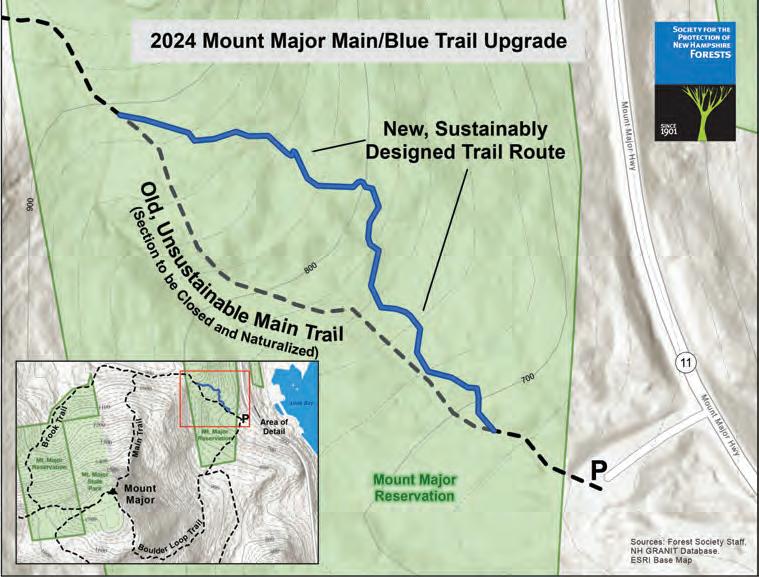

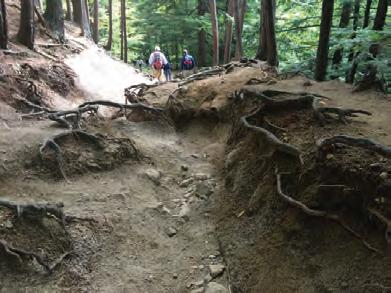
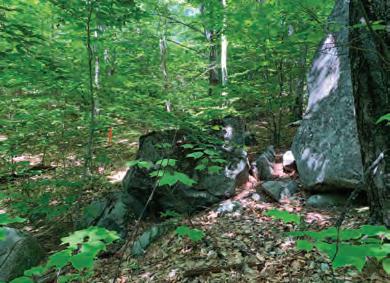
This spring, a sustainably designed trail, which will wind through an interesting boulder field (lower
will replace a severely eroded section of the Main/Blue Trail (upper
parking area from the NH Department of Transportation, built a small pavilion and map kiosk in the parking area, improved the base of the trail and trailhead, and increased the presence of volunteer trailhead greeters during busy times.
The upgrade of the Main/Blue Trail is a significant investment of approximately
been able to raise more than $200,000 to date thanks to a grant from the NH
and grants from the Bafflin Foundation, Meredith Village Savings Bank, and more than 100 individuals.
Now, as we prepare to break ground on the trail this spring, we have just under $100,000 left to raise We hope you will take this moment to make a gift or make an additional gift today. You will have the pleasure of walking on your investment for many years to come!
Name:
Address:
Telephone:
Enclosed is my tax- deductible contribution of $
Please mail the completed form to:
Society for the Protection of New Hampshire Forests 54 Por tsmouth Street, Concord, NH 03301
Or donate online at forestsociety.org/major trailwork
For more information, call Anne Truslow at 603-224-9945 or email atruslow@forestsociety org
54 Por tsmouth Street
Concord, NH 03301-5400
Address Ser vice Requested
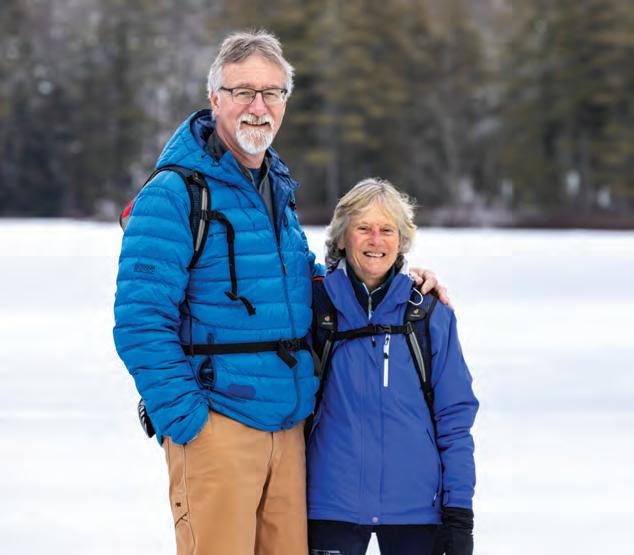
The two of us grew up in Keene and now live in Walpole. Kris moved to the area when she was five, and I am an eighth-generation native. Both of us have been involved in outdoor recreation as participants and educators for decades, and we continue to enjoy hiking, biking, skiing, paddling, and more After moving to Walpole, we built our house near several hundred acres of protected land, including the Forest Society’s High Blue Reservation, where I now serve as the volunteer land steward.
Through the work I do with SnowHawk LLC, my trail design and construction business, I have seen the increase in outdoor recreation and the impact it has made on trails. It is critical to maintain and, in some cases, rebuild trails using sustainable, long-term solutions. Good trails don’t build themselves and the experience I bring to trail projects allows me to share my passion
Lewis and Kristen are among the 10,000 members who help the Forest Society protect and manage critical lands for wildlife, water quality, wood, and wellness across the state
for working outdoors while showing others the reasons why the work we do is necessary
As part of the Forest Society’s Mount Kearsarge Outdoor Classroom, I worked together with staff to teach students about trail building on the Lincoln Trail at Black Mountain Forest as well as instructing many participants at the annual Monadnock Trails Week The Forest Society recognizes that recreational access to their properties is important to many and that trails are a key ingredient in granting that access
We feel incredibly fortunate that some of the trails that have shaped us are out our back door. Our hope is that future generations will also be able to benefit from the same places that we treasure. For these reasons we continue to support the Forest Society and the important work they do ”